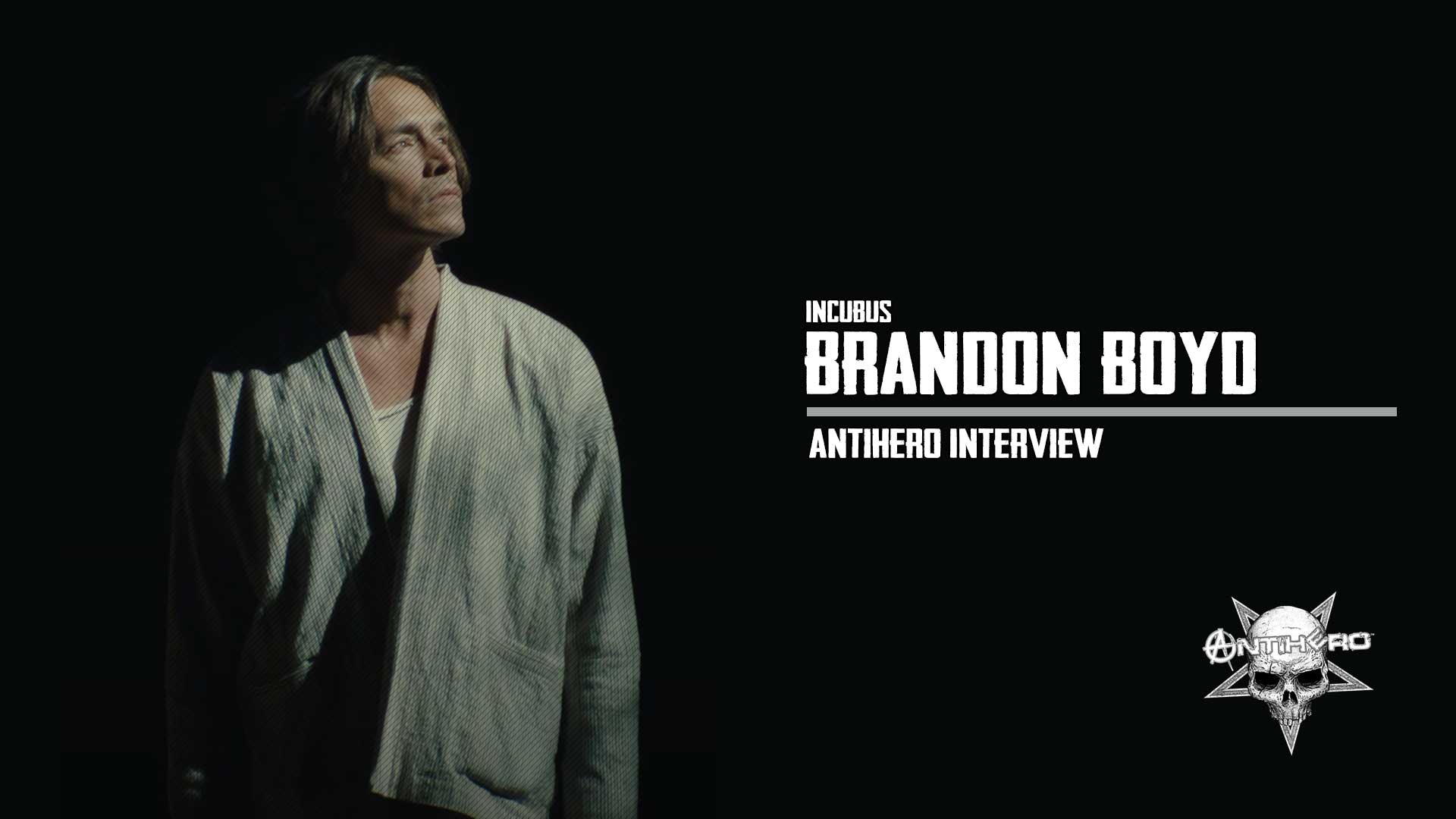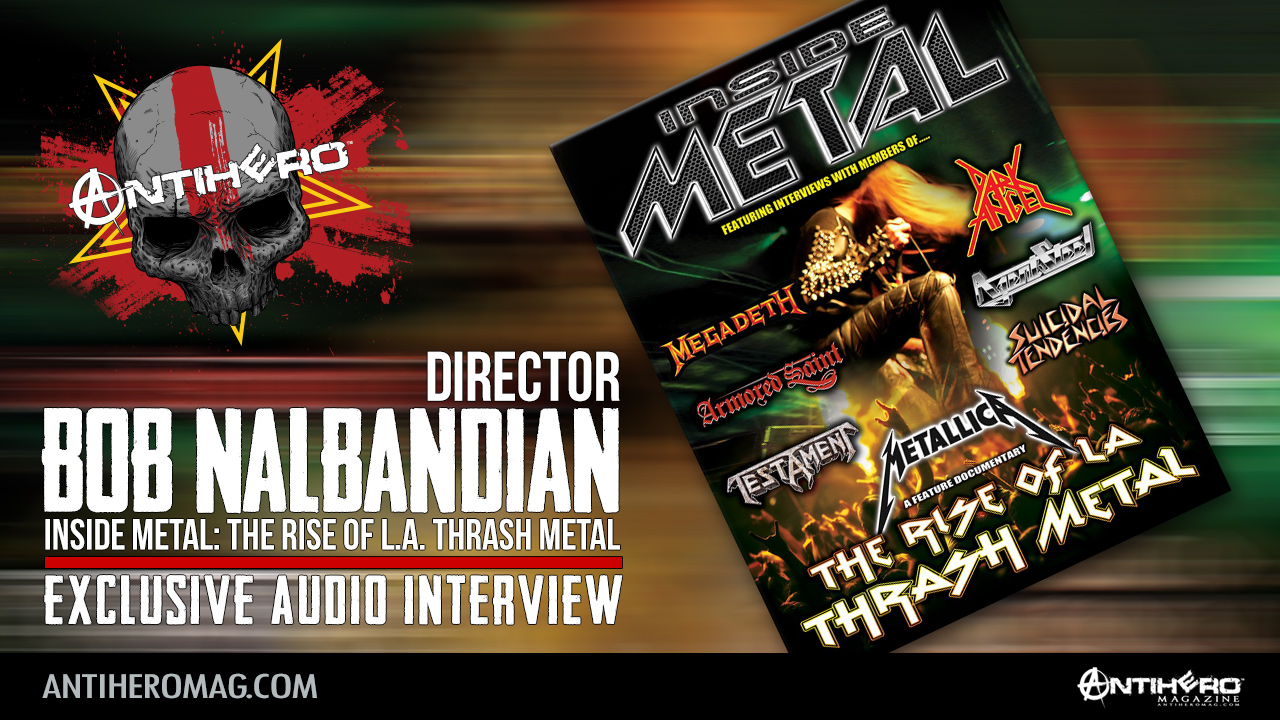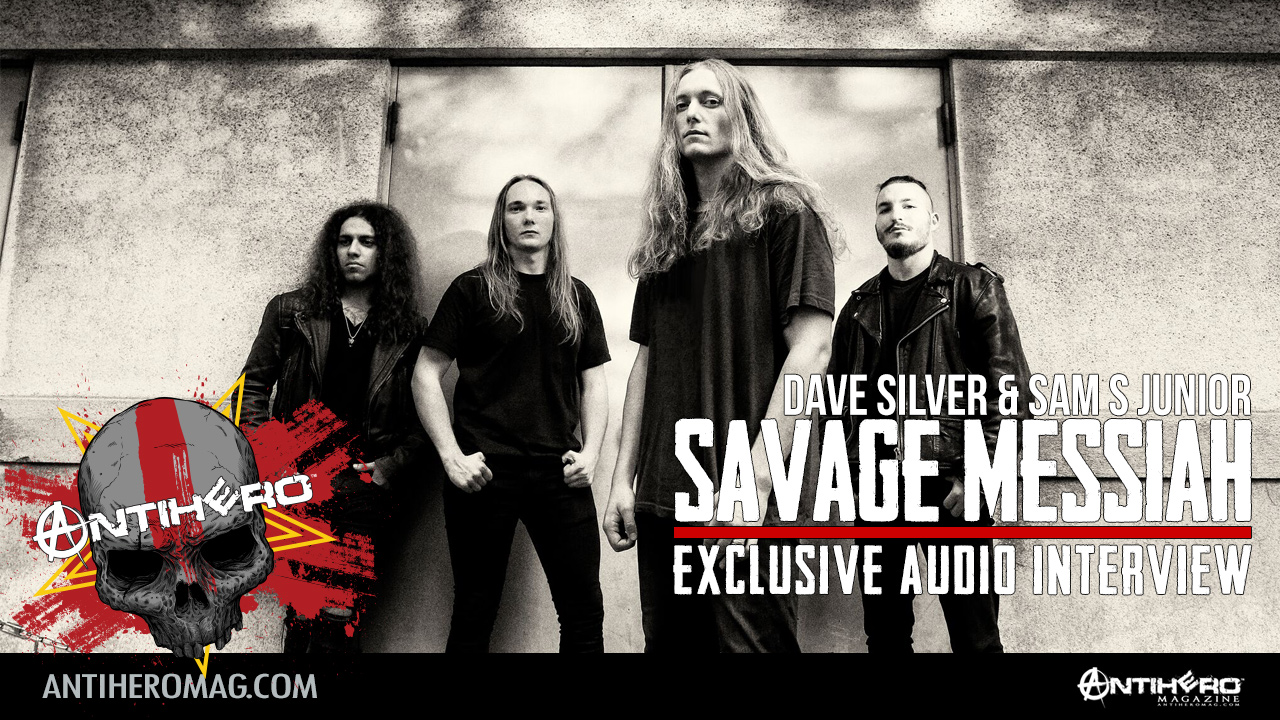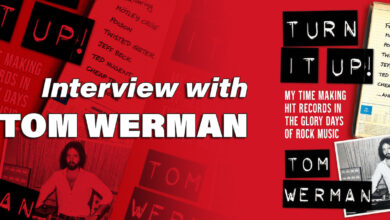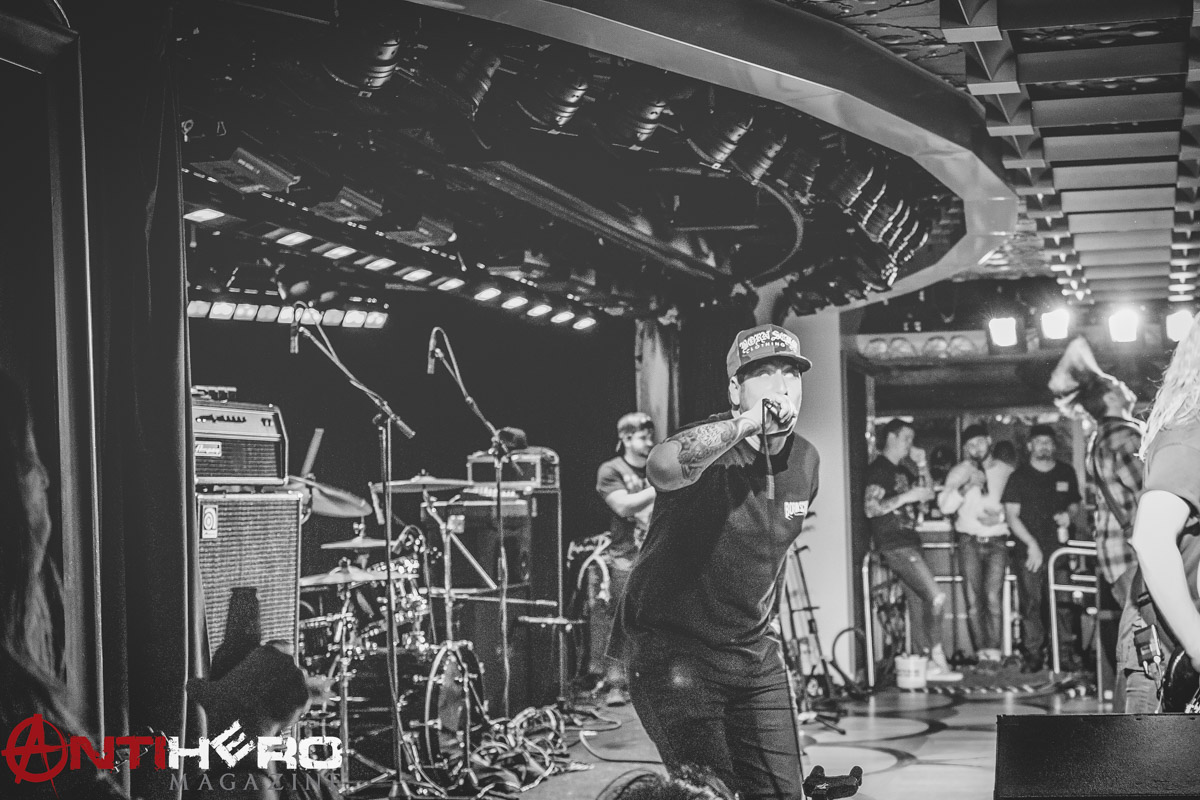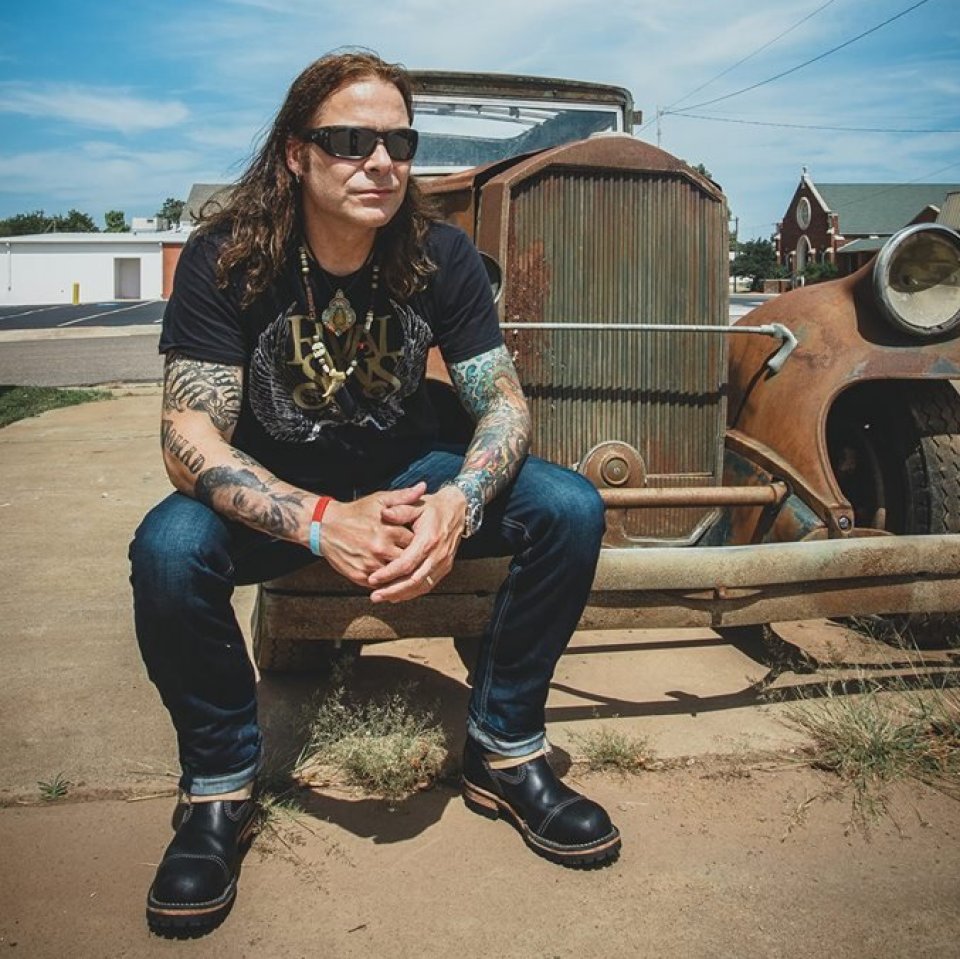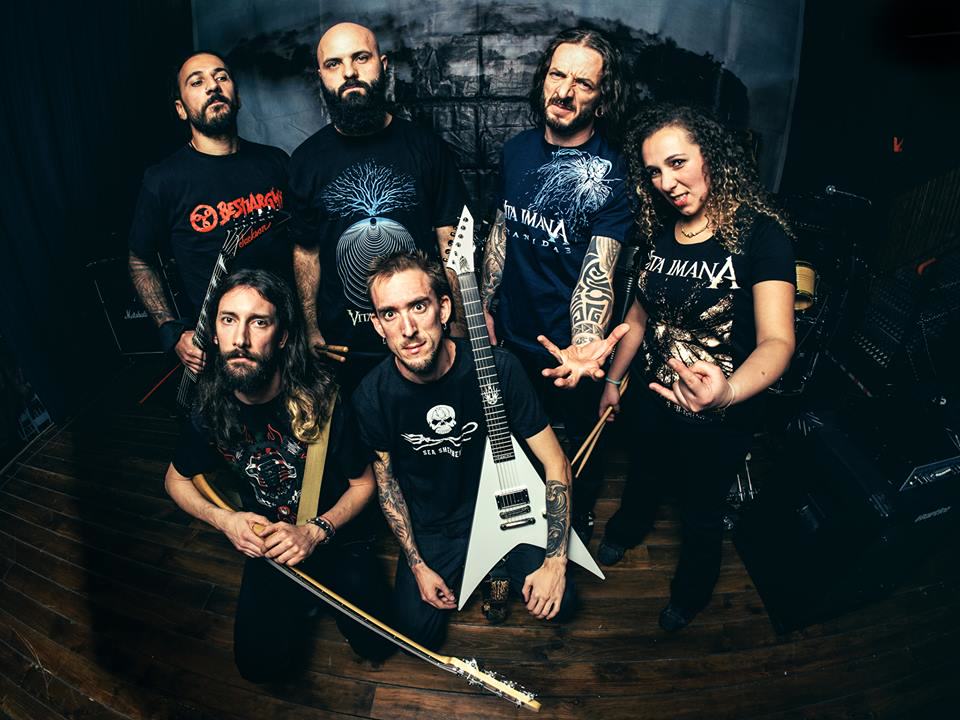INCUBUS frontman, Brandon Boyd, is an accomplished multi-disciplinary artist – painter, author, game-designer, philanthropist, songwriter, and vocalist. His new solo single, “Pocket Knife,” combines his talents, with the evocative single art painted by Boyd and the song co-written by Boyd and producer, John Congleton (Sigur Ros, Phoebe Bridgers, Lana Del Ray).
“Pocket Knife” is a harbinger of things to come on Boyd’s upcoming full-length release. The upcoming album will be titled ECHOES & COCOONS and will be released via Wit Hustle / The Orchard in the Spring of 2022
I recently had the opportunity to catch up with Brandon to have a great and very in-depth conversation regarding a variety of topics.
ANTIHERO: You have a new album coming out soon. I just wondered about the whole creative process for that in what was a different world environment.
Brandon Boyd: Yeah, it was about as different as the process has ever been. There are all of the obvious reasons being that it was written and recorded during a pandemic and during the height of lockdown. But it was interesting because I’ve done quite a few over the last few years, quite a few of the vocal recordings to Incubus albums and stuff here at my house. I have a very humble recording set up, but it works well for what I’m trying to do. But I had never written an album at home away from other people. A lot of the stuff gets written when we’re writing Incubus records and in my other solo projects and stuff, I’ll write with people in the room for probably a half of the time, three-quarters of the time. And then I fine-tune at home by myself and hyper-focus and get granular with things. But in this case, it was written entirely remotely. So, John Congleton and I connected and we started sending song ideas back and forth over emails and would chat about things over FaceTime. And we never even met in person until after the record was finished. So, the record was recorded completely remotely and ended up being a fun and interesting experience. It was just what the doctor ordered for me during the lockdown. I needed something to dive into wholeheartedly, lest I get depressed about the circumstances happening around me.
ANTIHERO: Yeah, sure. I just want to ask here; did you find that the enforced downtime fuelled your creativity or at times, maybe stifled it as well in terms of impact on mental health?
Brandon Boyd: It stoked my creativity. Here in California, it was ridiculous for a period of time. And it was for a while too. I think it was the better part of a year. The state parks were closed, beaches were closed. And normally when I have time off, I go and surf and you would get arrested and fine and have your equipment confiscated if you went surfing, which knowing what we know now, I think it was a little bit of an overreach, but I was in that period of time.
So yeah, I dove headlong into this and it’s not as if I didn’t have some psychological challenges during this period of time. I feel like you’d have to be superhuman to have gotten away unscathed over these last two years, without having some part of your psychology or your spirit dinged in some way or other. But there’s a lot to be learned from the experience as well. And the way I like to look at things is when I get dinged or if something leaves a mark, then it’s obvious that there was an area in my life, whether it’s in my spirit or in my psychology, that was a stone that was left unturned. And so, I got lots of opportunities to turn over some stones that had started to grow some moss.
ANTIHERO: I was going to ask, has it presented, all this forced extra time, new challenges to maybe your own personal beliefs, your own spirituality of how you view and perceive different things in the world?
Brandon Boyd: Yeah. That’s a good point. I think that I’m learning that I’m not alone in having had the veils pulled away from my eyes in so many capacities. I started this experience, like so many of us did, taking it at face value and I’m now two years in trying to look further and further behind the curtain because it’s become so obvious that there’s so much that’s not being said, that needs to be said. Not only from interpersonal places, but also from a political and societal, and cultural stance as well. There were so many stones left unturned and they just started to get flipped over. And we could have, I think we still can pace ourselves with how quickly we’re turning over these stones and look, as any of us can only handle so much before we just pop. But it has been a very interesting period of time in the last two years I have grown. It started to feel like I’m politically homeless in a sense. I think most of the leaders out there, especially the ones that are on TV telling us what’s going on, it seems like they’re all fucked. I don’t know how else to say it. And honestly, I’m in a place now where I am truly humbled. I don’t really know what the answer is, and I don’t claim to have any answers, but that place of that agnostic stance, so to speak or I love the term epistemic humility. That epistemic humility, I think, is a good place to be, in a place where you’re ready to learn. And I care less about being right. And I just want to know what’s going on. I want to know. I’d like to know what’s happening in the world and there’s so much purposeful obfuscation happening in our media, around the entire world, and in our government. It’s just a little infuriating. I will say though, that I feel for people that decided to become politicians four years ago that find themselves in positions of power now. It’s like, good luck with that, buddy.
ANTIHERO: Obviously you do art as well. Did you find that your art and drawing, did it also take on a different perspective from what was going on around you? Did that affect how you created through your art?
Brandon Boyd: I think that it most certainly has. The actual verifiable ways and the measurable ways in which it has affected me have yet to reveal themselves. I do know that I’m painting and making music with a fervor and a pace that I don’t remember ever having had before. And I think part of it must be just all the time that I found, being that we haven’t been able to tour. We go out, we have a handful of dates in March, and then we’re hoping to be on tour this summer if COVID allows us to. But having all this time off of the road, I have definitely rediscovered my love of continually making music and painting pictures. It’s more of fits and starts. That’s how I’ve gotten used to it, where there are periods of time where I hunker down, and I focus on music or hunker down and focus on art. And over the last two years, it’s been a constant thing I do every day. I’m either making music or in my studio painting. But I enjoy it. I have been enjoying the heightened pace of those things because these two things ultimately bring me a great deal of joy and fulfillment to paint and to make music.
ANTIHERO: Is it important for you personally to have several different artistic or creative outlets? You can express yourself in different ways.
Brandon Boyd: Yeah, it definitely is. I’ve always known that, but I suppose I’ve been coming to understand it a lot more clearly over the last couple of years. I feel a little bit, not lost. Let’s just say for lack of a better term, I feel a little bit lost when I’m not making music or painting. And it turns out there are other things that I enjoy doing as well. I’ve been writing quite a lot as well. There’s a great internet phenomenon called Substack. I’m going to have a Substack publication as of probably early next month, February. And it’s a lot of writing and it’s a lot of sharing of paintings and sharing of sketches, but it’s also going to be a place where I’m going to share demos that never made it all the way into full production of songs. And there are a lot of them over the years. I do sketches of songs and then put them away and sometimes I even forget about them. And then sometimes I will unearth one and be like, “This is a good song. I’ll share it with the guys in the band.” And we’ll turn it into songs. But yeah, I have a lot to share, and I love making stuff. So hopefully people will continue to absorb it.
ANTIHERO: Do you ever have creative blocks or is it maybe sometimes you’ve hit a point where you can’t get a song out, you’re struggling musically to express what you want, and you go in and just do something else? You can switch to art, writing a book, or whatever. Do you find that helps then, if you hit a creative block in what you’re trying to do, that you can switch like that and switch it to different things at any turn?
Brandon Boyd: Yes. For sure. Creative blocks are so normal as to be common. And I had periods of time in my life where I would freak out around. I don’t know what to do with this part. I don’t know what the lyrics are, or I don’t know what I want to do with this thing that I’ve been handed that’s so cool. And I’ve learned over the years that freaking out about it and having an anxious response is the least constructive way of handling it. When I am creatively blocked and nothing is going to happen, I don’t freak out about it anymore. Basically, I go for a walk. I go ride my bike and you let your brain go somewhere else completely. Remove yourself from the environment. And you essentially, by introducing novel things into your process, like fresh air. It’s a big one. Have a cup of coffee or less coffee depending on the person. Anyway, the point is that by freaking out, you’re only going to dig yourself further into the quicksand. So, what I do is just stop, go for a walk, go for a surf. And then that thing that was blocked, will just randomly show up when it wants to. It almost has a personality of its own, which is fun.
ANTIHERO: Just touching on music, how do you explain the longevity of Incubus as a band? Do you feel it’s because you’ve constantly evolved and not fitted into a little box or a bracket, that you’re constantly changed? And obviously, that helps you in terms of extension of the band’s life.
Brandon Boyd: I stopped trying to figure out why people still want to listen to our band a long time ago and I’ve come to embrace it and come to just let in the wow-ness of it. I’ll just speak for myself. I can’t speak for the guys in the band. I’m in a place with it where I’ve always had a deep level of gratitude for the countless people over the years who have listened to our band and critiqued our band and adored our band or hated our band. It’s amazing to even be part of someone’s experience, whether they like it or not. You could even not like our song, but you know the words. There are certain songs of ours that have become almost part of the landscape where it’s like, “I know this song, fucking hate this song, but I know it.” Even that to me is quite so special to have that opportunity. But why it’s lasted as long as it has, that’s one of those things where I’ve stopped trying to figure it out. And I just embrace it and be thankful for it because it’s a wonderful thing.
ANTIHERO: I guess also because you have a solo career that’s operating in tandem with the band, it allows you the opportunity to step outside of the band and do other things as well?
Brandon Boyd: I think so. I think you’re right about that. All of us in the band have extracurricular activities that we engage in. And some of them aren’t even in music, but they’re deeply creative. But everybody goes off and does their own music stuff. And the way that I’ve jokingly but accurately referred to us as we’re like a long-term polyamorous marriage. And we’re each other’s mains. We go off and we have crazy weekends in The Bahamas with our other lovers. And then we come back and it’s like, “Wow, this is the best fun of all.” That’s why we always come back because we don’t try and tether each other to anything. And lo and behold, we all want to come back home.
ANTIHERO: What was your own personal introduction to music growing up? Can you recall, was it a song on the radio, your first gig, something that started that drive in you? This is what I want to do. This is what I want to focus my career on.
Brandon Boyd: My earliest memories of music are my mom singing and playing the piano. We had a baby grand in our living room growing up and my brothers and I would play under it as she was playing music and singing. And then her dad, so my grandfather had this beautiful nylon string guitar. And we spent quite a lot of time at my grandfather’s house growing up. And my brothers and I would sleep in the guest room. And every time we would lay down to go to bed, he’d come in with his nylon string guitar. And he would sing us to sleep with these beautiful soft songs that he was singing in Spanish. And I remember drifting off watching him play. And I don’t remember how old I was, but I was young, probably four or something, four or five years old, early memories. And I remember watching him and watching his fingers move on the strings and it felt like he was doing magic. And it always stuck with me how powerful it is to be able to make beautiful noises with your hands and with your emotions and with your singing and all these things. So, I always was deeply interested in music, and I was always surrounded by it and then started going to rock concerts when I was about 13. And then I remember by the time I was 14 or so, watching people on stage, speaking of growing up in Los Angeles, it was basically like everybody came through town. And so, I got to see a lot of incredible concerts. But I remember at a certain point as a young teenager, just being like, “I feel like I might be able to do that.” I feel like that’s what a lot of us do. And then we’re lucky enough to find people that we want to pair up with and make sound with. We basically did our best.
In this case, it was Mike Einziger and Jose Pasillas, but we were basically doing our best to sound like the bands we were going and watching. So, we wanted to sound just like Primus and just like the Red Hot Chilli Peppers and just like Mr. Bungle. And so, it was our band initially, and it was Incubus, it was with Mikey and Jose. Essentially, we were just like bad imitations of all the bands that we were obsessed with. And then by the time we’d been playing together for five or six years, we started to find our own voice. And that’s when things started to veer into our own lane, so to speak.
ANTIHERO: Obviously Incubus and your solo work have had a huge level of success. Do you still feel personally you have a lot to prove? Are you all still pushing at yourself, driving yourself to greater heights even now?
Brandon Boyd: I think so, yeah. I don’t know if something to prove is the most accurate way of describing it, but it feels a little bit more like loving compulsion. I don’t know. And that could just be because it’s been my way of life for 30 years. I’m sure that has something to do with it. But there’s also the same feeling attached to it as when we first started. This is a place where it feels like we can make magic. It feels like remembering the way that my grandfather playing my brothers and me to sleep would make us feel. We’re not trying to play people to sleep, but what we’re doing is we’re just trying to share these capacities to literally change the chemicals in the room and perhaps have some loving or benevolent impact on someone’s life. And part of it too is quite selfish. There’s something to be said about the desire to make art, which I have at an inner level, but it’s one thing to make art, but then it’s almost impossible to be objective about what you’ve made. Through the act of sharing art, that’s how we really have a chance to maybe understand what it is that we’re trying to say. And so, it’s that mirroring effect that’s been incredibly beneficial to me and I know to the whole band. And it’s one of the things that we’re so grateful for collectively.
ANTIHERO: You have been involved in Incubus in the music industry for quite a long time. And so, obviously, you’ve seen many changes, primarily I guess in terms of monetization. Do you feel it’s harder or easier for a musician these days to survive?
Brandon Boyd: That’s a big question right there. I don’t know if there’s a clear answer. It’s complicated. In so many ways the landscape has become more democratized and so anybody can put anything out. We’re carrying around a broadcast tool in our pockets, almost every single one of us. So literally anyone can record a song and put it out. And there is the possibility that it can go viral, and millions of people will listen to it and enjoy it. That being said, I think that it’s probably harder to make a living now as a musician than it’s ever been. Having the wide scope of streaming platforms is great, but unless you’re in the Drake streaming numbers, you’re not really making any money. You get fractions of a penny per spin and that’s on one of the good streaming sites if you’re a musician. So, if you’re not in the millions or tens of millions, you’re not making a living. So, we have a lot of improving to do as far as our technologies and the ways that we treat artists, but that’s always been the case, hasn’t it? I think artists have always been both highly revered from a cultural point of view and then treated like shit at the same time. It’s a funny, complicated relationship we have with the arts. So hopefully one day I’ll be able to have a clearer answer to your question.
ANTIHERO: Obviously as well, you mentioned the lack of touring over the last couple of years. Obviously, you had that source of income cut completely from you. Has that then pushed to look at other sources of revenue, explore other directions?
Brandon Boyd: Yeah, for sure. I’m lucky to find myself in this period of time during the COVID era, lucky that I’ve had a career in music that can withstand this gap of not being on tour. I know so many musicians that weren’t able to survive that gap and they had to sell instruments and they had to completely get other lines of work. And there’s so much tragedy in that. But there’s always a silver lining if you know where to look or you know that to look. To me, the silver lining always exists. It’s just how capable and or willing we are to look for it. And so that’s essentially what I’ve been trying to do. I knew that we would eventually get back on tour and I’m so excited to go back on tour because it’s an incredibly unique experience.
But yeah, I’ve been doing lots of other things. My girlfriend, Sarah, she’s recently retired ballet dancer. She was the principal dancer at the Semper Opera in Germany, in Dresden. And she retired about four, five years ago and she retired because she was offered a great gig as a star in this television show on Starz. It’s called Flesh and Bone. It’s good if people haven’t seen it. So, she’s an actor, but she also has been producing films. And I’ve been on the sidelines watching her through the pandemic. This girl hustles. It’s wild to watch. She’s a great producer as well as an actor. And she and I have been working on a few projects, film projects.
So, there’s a film that she did during the early days of the pandemic. And wild, they bubbled up, it was 14 people, and they made a fucking movie during the pandemic, and nobody got sick. It was cool. But the movie is going to come out this year. It’s called Unidentified Objects. And so, I was an executive producer on the film as well as a music supervisor. So, it was a fun, new experience for me. And it was born mostly of not only a deep love and admiration for filmmaking but also proximity. My girlfriend was making this film and there were areas that they needed help that I knew I could help. Let me come in here.
ANTIHERO: Just a couple then. You mentioned obviously the album’s coming out soon. Touring plans, what’s the situation currently in terms of the whole touring in the states where you are? Are bands still touring? Are gigs still being canceled like they are in the UK? What’s the current situation?
Brandon Boyd: I’m assuming that it’s similar to what’s going on in the UK here in the states. Tours are happening. A lot of them are starting and stopping and starting and stopping. And the one quick tour we did in 21, it was eight shows. And four shows in, I got COVID and we had to stop for a month. And then we came back and we finished it. And that’s what I’ve been understanding is that there are tours happening, but they’re very “stop, start, stop, start, stop, start.”
And then there are tours that are out there that are at pretty furious paces that nobody gets sick and the whole tour happens and it’s eight weeks. And it goes off without a hitch. And that’s amazing. So we are going to do our shows in March and do everything in our power to keep everybody healthy and safe. And then we’re hoping to be on a proper tour in the US this summer. And we just have to be as adaptable and patient as possible. And God and science willing, we’ll be on tour in the UK and Europe at some point in the near future too.
ANTIHERO: Just a final one then. I’m sure you’ve done many interviews, but if you had to sit down and interview one of your own personal heroes, who would that person be? Maybe not even a musician.
Brandon Boyd: That’s a great question. Wow. There are so many people that I admire both in the arts, but also in different fields and psychology and science. I don’t even know where to begin. I would love to have had the chance to talk to Terence McKenna. Gosh, this is a big question. There are so many people. I would love to sit down and talk to some of the artists that I grew up admiring, like Rick Gryphon or Stanley Mouse. I don’t even know where to begin. My head’s just sitting with that question. Wow. There’s an interesting chap. I read all his books now. He’s a psychologist, but he specializes in the psychology of morality. His name is Jonathan Haidt. He wrote a book that’s probably his most famous, it’s called The Coddling of the American Mind. He talked a lot about moral psychology and he’s able to draw these maps around trends and why certain subsets of people will drift into certain directions politically or ideologically. And I have lots of questions for that guy, but I don’t even know. I could keep going forever. I’ve been fascinated by so many people for so long. So, I guess we’ll just leave it there.
ANTIHERO: Yeah. Thank you very much. My time is up. Thank you very much. Good luck with the album. Hopefully, you’ll get to the UK sooner rather than later.
Brandon Boyd: Yeah, I hope so too. Thanks for your time, man.

